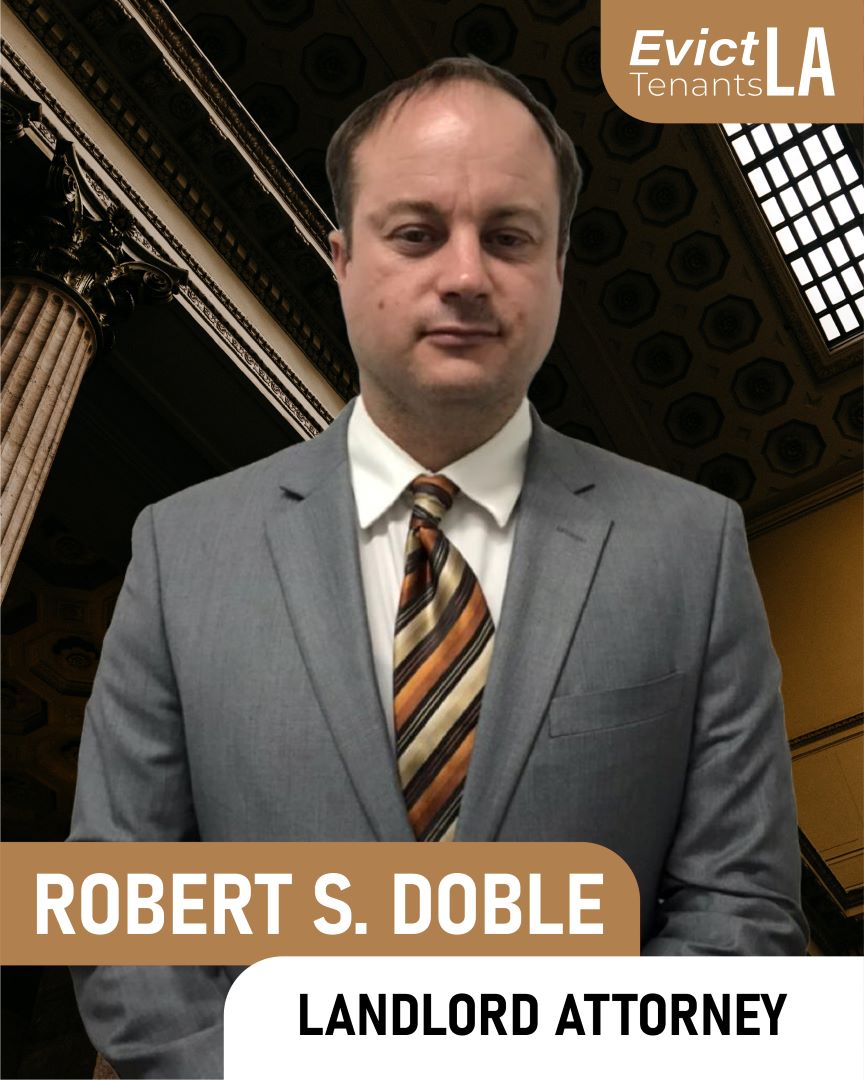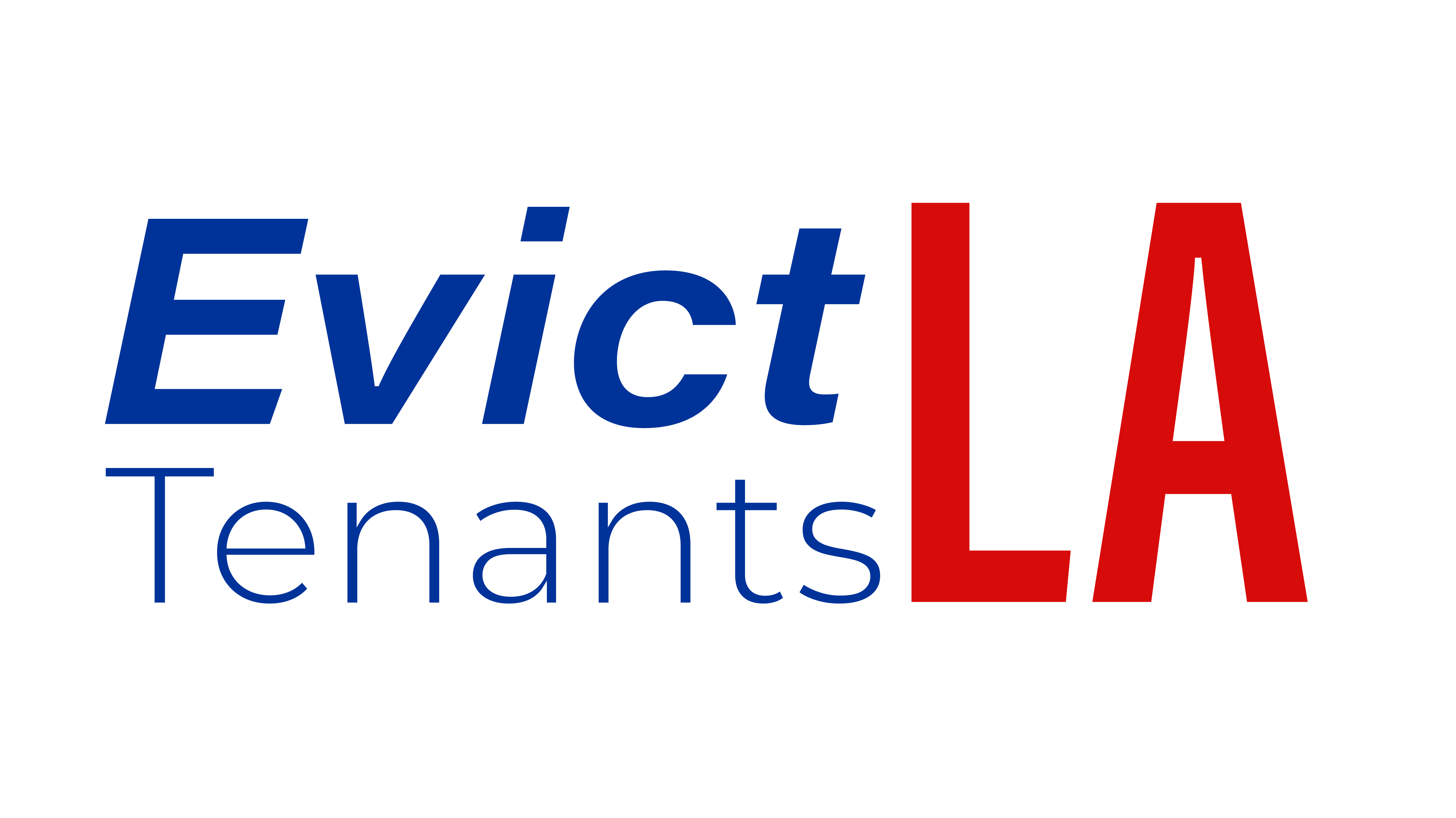Eviction Attorney California
Rikisha D. Thomas & Robert S. Doble
los angeles
Attorney for Eviction

New Case Submission
Eviction Services in California
Clear road of the eviction process.
The sheriff or marshal will only evict a tenant under a court order in California known as an Unlawful Detainer Judgment. The get such as judgment, the landlord must bring an eviction lawsuit.
The key to an unlawful detainer suit is proper terminations; without it, you can not start the eviction lawsuit.
The termination notice seems simple; however, you must pay attention to the details—any mistake on the termination notice will end up losing your eviction lawsuit. That is why you need to have an attorney who knows landlord-tenant law. At Evict Tenant LA, we have an experienced attorney who knows landlord-tenant law.
The properties that are under rent control have specific rules for termination notices. Before we give this notice of termination, you must read the rules and regulations of your rent control ordinances.
Terminations notices:
- 3-day Notice to Pay Rent or Quit
- 3-day Notice to Perform Covenants or Quit
- 3-day Notice to Quit
- 30-day or 60-day Notice to Quit
- 90-day Notice to Quit

Why is Proof of Service Important?
Serving documents especially the Summons and Complaints when you are in need for Eviction Lawyers in California is crucial, and the landlord needs to be very careful in serving as the failure of the landlord to strictly follow the rules governing the service means that the judgment can be dismissed. The steps in serving Summons and Complaints is very important to a lawsuit because it notifies the parties involved about the existence of a court case and all actions taken in the case. A case cannot move forward if the documents are not served. A landlord cannot serve his own document, he has to follow certain procedures. Here are the following allowable ways on how to serve Summons and Complaints:
1. Personal Service: This can be served not by the landlord himself but of someone of at least 18 years of age, preferably and highly recommended, a certified processor and not a party in the lawsuit. When you need to evict a tenant in California, even if the tenant refuse to accept it, it is deemed served as long as it has been personally handed or personally presented.
2. Substituted Service: It is being used if personal service has failed with three attempts to serve the tenant. This can be done by leaving the document to someone who is a competent person found inside the premises or the property being rented, with at least 18 years of age and preferably and highly recommended, a certified processor. The server should inform the nature of the documents to that person. After leaving the documents to the substitute person, a copy should be mailed addressed to the place where the documents were being left.
3. Posting and mailing: This requires the landlord to seek written permission from the judge upon proving that several attempts to serve the documents failed and if the tenant is served by this procedure, the tenant can answer only within 5 to 15 days. After the landlord or the landlords lawyer has filed the complaint, a clerk will mail a Notice to the Defendant stating that an unlawful detainer has been filed. That is the proper way Eviction Lawyers in California and Landlords should proceed.
What is California Tenant Protection Act of 2019?
In January 1, 2020, a statewide law took effect and will last until January 1, 2030 that specifies that in order to end a tenancy, a landlord must have “just cause.” Only after all tenants have occupied the unit for 12 months or more, or after at least one renter has done so for 24 months, do the eviction clauses take effect. A tenancy cannot be ended without one of the permitted “just cause” grounds, which must be specified in the notice of eviction. Just cause” explanations can be classified as “at-fault” or “no-fault” explanations. “No-fault” evictions necessitate relocation help. A tenancy cannot be terminated for “just cause” simply because a lease or rental arrangement has come to an end.

What you need to know on evictions by 30-day or 60-day notice?
Prior to bringing an unlawful detainer claim against a tenant, you must take legal action to terminate the tenancy. You can use the 30-day to terminate in a month-to-month tenancy but in most cases, if the tenant has lived to the property for a year or more, you must give the tenant a 60-day notice. You can file a lawsuit against the tenant if, by the end of 30-day or 60-day notices, does not comply and stays in the property.
Please take note that a fixed term type of tenancy may not be terminated by these notices before the agreed end of fixed term unless for a reasonable cause like non-payment of rent or violation of the lease terms. On periodic type of tenancy (rent is paid every period), may be terminated by 30-day notice.


What you need to know on Eviction for Nonpayment of Rent?
Prior to bringing an unlawful detainer claim, the law requires you to cancel the tenancy. To effectively end a lease for nonpayment of rent, you must inform the tenant if there is a rent default. A written notification of three days using a form known as a Three-Day Notice to Pay Rent or Quit.
When to File Your Lawsuit
We have emphasized that you cannot start your lawsuit for wrongful eviction up to the three-day the notice time is over. The amount of time a three-day notice provides the tenant’s decision to pay rent or leave relies on when the notice is delivered on a weekday and whether any weekends or court holidays falls before the expiration of the notice. Three business days, not three calendar days, are the notice period countable days.
What happens after the Three-Day Notice is served?
The next steps you should take after serving the three-day notice depends on the tenant’s ability to pay the entire amount due and remains or move out.
If the tenant pays the entire rent in advance before the end of the three-day period, you must accept it if it is provided in the form of cash, a certified check, or money order. If you decline to take the rent or are adamant about it and demand more than what is stated in the three-day notice, (for example, late fees) and file your lawsuit, your renter will have the opportunity to oppose it and win.
Every so often, a tenant will reply to a Three-Day Notice to Pay Rent or Vacate by actually relocating during the next three days. When the tenant chose to move out rather than paying the rent, they still owe you a full payment after the three-day notice because rent is paid in advance, one month’s worth, and you can still file a small claims lawsuit for the remaining amount due.
COVID-19 Rental Debt and Transition Period Rents
Whether any outstanding rent related to rental periods between July 1 and September 30 in the year 2021, the three-day notice is subject to special rules. For those who are affected by COVID-19, recovery period rents from October 1, 2021, through June 30, 2022. Fill in the forms for Covid 19 unpaid rent and make sure the following are present:
- The warning is now for a period of fifteen (15) days, not a notice of three days.
- To itemize the amount of rent owed, list each either a distinct month or renting period.
- Tenants must be informed in the notification that they will not be evicted if, prior to the expiration of the lease, the tenant provides a declaration in response to the notice, a financial difficulty brought on by COVID-19.
- You must include the following language in your notice.
You must wait 30 or 35 (or 60 or 65) days after your 30-day or 60-day notice has been properly served before taking any further action. You will lose the case and have to re-submit it if you file an unlawful detainer complaint too soon.
Here’s how to figure out how long you have to wait:
- Service is complete when you personally serve the notice, or after you have mailed it following substituted service or posting. If you serve it by certified mail, though, you should wait an extra five days before filing suit.
- If you serve more than one tenant with notices, but not all on the same day, start counting only after the last tenant is served.
- Do not count the day of service as the first day. The first day to count is the day after service of the notice was completed.
- The tenant gets 30 or 60 full days after service. Do not file your lawsuit until at least the 31st day (plus any five-day extension on account of serving by certified mail) after service is complete.
- If the 30th or 60th day is a business day, you may file your lawsuit on the next business day after that.
- If the 30th or 60th day falls on a Saturday, Sunday, or legal holiday, the tenant can stay until the end of the next business day. You cannot file your suit on that business day but must wait until the day after that.
When the required amount of time has passed and the renter still hasn’t left, you can move on to the next step, which is filing an eviction complain

Impermissible Reasons to Evict with a 30 or 60 Day Notice
Exceptions that include tenancies governed by local or state laws governing just cause eviction, a landlord may evict a tenant without cause, but not for the incorrect motive. This means you cannot evict a tenant because of:
- Race, Immigration status, Citizenship status, Religion, Sex or sexual preference, Age, Disability
- If the “repair-and-deduct” option was used by the renter (by subtracting the cost of habitability-repairs associated with the rent) within 6 months, unless there is a valid cause for termination
- Due to the tenant’s complaints about the premises to local authorities, exercised rights given to tenants by law, or engaged in behavior protected by the First Amendment
- If your removal is unlawful or appears to be so, your tenant can assert themselves just as you are trying to the legal action for eviction and later sue you for damages. The primary reason for stating an adequate explanation for a "retaliation presumed" notice of termination (unless in places subject to rent control where the justification is required) is to assert your justifiable termination reason, which you can prove if the tenant complains of retribution.

If any of the following are present, think twice before evicting with such notices:
- The tenant is a member of a racial, ethnic, or religious minority group.
- The tenant is gay or transgender.
- The tenant has children and your other tenants don’t.
- The tenant has recently (say within six months) complained to the authorities about the premises.
- The tenant has recently (within six months) lawfully withheld rent.
- The tenant is disabled.
- The tenant is elderly.
- The tenant receives public assistance.
If none of these circumstances apply (and the rent control regulation does not apply to the property or leased through a government-sponsored program), you shouldn’t have any issues using a 30-day
or a 60-day notice with no explanation to end a lease agreement.
30-Day, 60-Day and 90-Day Notices
When ending a month-to-month lease, you must provide the tenant with written notice. This is how much advance notice is required:
- 30 days' notice if your tenant has occupied the property for less than a year.
- 60 days’ notice if the tenant has been in the property a year or more, or
- 90 days’ notice for certain government- subsidized tenancies.
Whichever notification is necessary, you must abide by any fair cause eviction requirements relevant to rent control laws, which typically include a list of the grounds for the dismissal of tenancy.

30-Day Notice for Tenancies of Less Than a Year
If your tenant has resided in your property for less than a year, you must provide 30 days’ notice to anyone who you intend to end a month-to-month tenancy. The same applies to tenancies with shorter periodic terms, like tenancies from week to week. Of course, you can offer the tenant a notice period longer than 30 days if you so choose. You must comply by providing at a minimum of 30 days’ written notice.
60-Day Notices for Tenancies of a Year or More
If your tenant has lived in the premises for a year or more, you must give a 60-day notice to anyone you intend to formally end a month-to-month lease. Giving your tenant a 60-day notice might trigger the tenant to serve you a written 30-day or more but less than your 60-day notice to terminate the tenancy earlier than the expiration of the 60-day notice that you give to the tenant.
Regardless of whether the tenant has lived there for a year or more, if all of the following are true, the landlord may end the tenant’s month-to-month lease with a 30-day notice:
- The property is a single-family home or condominium unit (as opposed to an apartment unit).
- You are selling the property to an actual (“bona fide”) purchaser (as opposed to transferring it to a relative for less than fair market price, for example).
- The buyer is an individual (not a corporation, a partnership, or an LLC) who intends to occupy the property for a year.
- You and the buyer have opened an escrow account to hold money that will be transferred during the sale.
- You give the 30-day notice within 120 days of opening the escrow.
- You have never previously invoked this exception, with respect to this property.
Unless the aforementioned statements are true, you must give a minimum of 60 days’ written notice to the tenant cancel a monthly or other recurring agreement whether the tenant has lived there during the tenancy for at least a year or more.
90-Day Notices to Terminate Government-Subsidized Tenancies
If you get rent from federal housing or other subsidiaries, from state or local governments, you may only evict for specific causes. Typically, the agency’s regulations or the form lease it created indicate acceptable grounds for termination. If your tenants are receiving assistance from a local housing authority under Section 8 or another similar program of a federal, state, or local agency, you must clearly explain in details the acts the tenant committed or when the breach of contract occurred that constitute a good cause for eviction.
The standard form leases that the housing authority mandates the landlord to use contain information about the legal grounds for eviction.
State and local just cause eviction laws severely restrict the grounds that landlords may evict renters. A month-to-month tenancy may only be terminated by the landlord for the grounds specified in the relevant statute. Most just cause clauses also provide for a specific justification to be given in the notification as well as in the subsequent unlawful detainer complaint.
The normal guidelines for 30- or 60-day notice evictions do not apply if your property is subject to state rent and eviction control or if it is located in a city that demands just cause. Even though an eviction is permitted by state law, it could be prohibited by a tougher municipal rent control statute or a state just cause requirement.
If the tenant pays the entire rent in advance before the end of the three-day period, you must accept it if it is provided in the form of cash, a certified check, or money order. If you decline to take the rent or are adamant about it and demand more than what is stated in the three-day notice, (for example, late fees) and file your lawsuit, your renter will have the opportunity to oppose it and win.
You should verify a current copy of your ordinance for any just cause requirements for your property before beginning an eviction by giving a 30-day or 60-day notice. If you’re still unclear, consult your local landlords’ association or a lawyer who often handles cases similar to this one in your area.
It is not a good idea to evict a renter after giving a 30- or 60-day notice if they don’t pay the rent. You must wait a lot longer to initiate an unlawful detainer and cannot receive any compensation for the overdue rent. Additionally, by using a longer notice based on unpaid rent, you deny tenants the opportunity to a conditional notice that allows them to remain if they make the rent payment. In contrast to a three-day notice to pay rent or quit, which permits tenants to stay if they pay rent before the conclusion of the notice period, the extended notice provides more time but is unconditional.
If, following receipt of a written warning from you, the tenant continues to refuse you or your agent entrance to the property (provided you give the renter due notice of your desire to enter).
You can evict the tenant if you need to exhibit the property to potential purchasers, make repairs, or maintain it.
If the tenancy is month to month, a landlord who wants to live there (or for a spouse, parent, or kid) may give the current renters a 30-day or 60-day notice to vacate.
In rare situations, if the lease is month to month, a landlord can utilize a 30-day or 60-day notice to evict renters if they need the property for substantial repairs or remodeling.
A landlord may use “good-faith” demolition (not driven by the fact that a rent control policy is in place) or condominium conversion to evict a tenant in order to permanently remove the property from the rental market.
A tenant who sublets, assigns, or adds a new occupant without the landlord’s consent is in violation of any written rental agreements that restrict the tenant’s ability to do so or that place a cap on the number of inhabitants allowed in the flat. Depending on your specific lease, the breach may or may not be remediable outside of certain rent control areas.
You can use a 30-day or 60-day notice to start the eviction process if the tenant is upsetting other tenants or badly harming the property.
When a tenancy is month to month, a landlord may begin an eviction by utilizing a 30-day or 60-day notice if the tenant has engaged in (or, in some places, been found guilty of) substantial criminal activity on the property.
